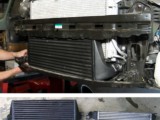Improving Fuel Efficiency Using After-market intercoolers
Posted by Henry on 1/2/2014
Intercoolers work by cooling the compressed air that is generated by your turbocharger. Your turbocharger, sometimes called a turbo or a supercharger, compresses air to pass more oxygen into your combustion chamber. The more oxygen that passes through, the more torque and horsepower your engine produces. Intercoolers take this process a step further by cooling the air to make it denser.
The denser air is, the more oxygen is in it. Oxygen is used to create a reaction with the fuel that is injected. Higher oxygen levels lead to more efficiency with each fuel injection. Not only does your engine produce more power, but it does so with less fuel.
Additionally, the ability to burn more fuel in an injection cycle means that your engine goes through fewer cycles when traveling. The decrease in fuel injection cycles allows your vehicle to use less fuel overall, saving you gas money and prolonging the life of your engine.
After-market intercoolers take your stock system a step further by cooling the compressed intake air even more. These larger intercoolers make your engine work less while producing more. After-market intercoolers also last longer because they are larger and better designed to prevent heat soak, an issue where your intercooler itself becomes hot. This typically happens during long trips when your turbocharger kicks in more than usual.
Improve your fuel efficiency by replacing your stock intercooler with a larger, more efficient after-market intercooler. These after-market intercoolers give you more power with less fuel, prevent heat soak and help prevent your engine from overheating, effectively extending the life of your engine. Combine this addition to your vehicle with a smaller pulley for your turbocharger to increase the power of your engine even more.








